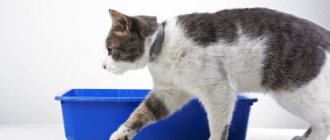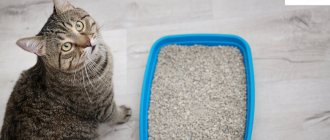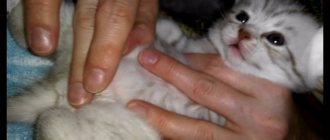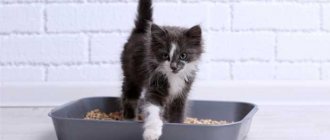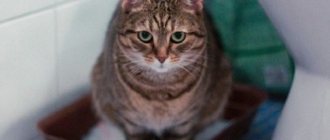“How often should my cat “poop”?” “How many times a day does a kitten poop normally?” While not glamorous, these are valid questions that every cat owner has asked themselves at one point or another. According to the Cornell University College of Veterinary Medicine, healthy cats poop one to three times a day.
However, the exact frequency with which cats and kittens will have a bowel movement depends on various factors, including their diet, age and lifestyle, underlying health issues, degree of stress/relaxation, etc. But this doesn't say much about how much. since your pet has to go outside a day, right? Probably not, but hopefully this comprehensive article on gut health in cats will help.
How often?
If you are the proud owner of a kitten, then you have to clean the litter box more often. Why? Babies eat in relatively small portions, but often. Here's the result. An adult healthy cat relieves itself approximately once a day. Owners of “domestic” cats are a little more “lucky” in this regard: after all, you are the one who keeps the litter box clean. So you have the cards in your hands, if you wish, you will know exactly where, how much and how often. It's a little more difficult with street cats. There is only one way out - keep the animal in the house for several days.
Habit of marking territory
It is quite possible that frequent visits to the litter box are caused by a completely ordinary instinct that forces cats to mark their territory. This is also typical for some cats, who nevertheless behave more restrainedly and, instead of marking their owner’s things, simply often go to their litter box. Of course, all this is usually accompanied by a characteristic meow. This behavior can also often be seen in pregnant individuals.
If you are sure that the animal is not sick, there is no need to worry about this.
Why does a cat get constipated?
Constipation can be said to occur when an animal has bowel movements every other day or even two days. If you suspect something is wrong, you need to conduct your own research, checking the eating habits and preferences of your pet. Lifestyle also matters: lazy couch potato cats, as a rule, walk around less often than their more active relatives. Activity in purely domestic cats should be supported and even stimulated by offering them appropriate outdoor games and entertainment. Perhaps the pet's food is made from medium-strength wheat (filler), other grains (rice), and contains a lot of carbohydrates. We must not forget that cats are naturally carnivores; they need meat and animal protein. Be sure to check how much your family pet drinks. Lack of moisture almost inevitably leads to constipation.
As you can see, it is not at all necessary to drop everything and immediately run to the veterinarian. There are some things you can handle on your own.
Cat poops: the norm per day
Before we talk about specific factors that may cause your cat to go to the toilet less often or more often, it's important to cover the basics. A general rule of thumb is that your cat should have a bowel movement at least once a day. It is equally important that the stool is of a certain shape and color: ideally, not too hard and not too soft, a normal brown color. Another important question to ask yourself is how difficult or easy it is for your cat to actually poop. Your cat should not strain or meow during feeding as he should pass the stool without any discomfort or pain.
© shutterstock
So, a healthy cat should:
- Poop at least once a day
- Bowel movements occur normally without straining.
- The stool will be well formed and brown in color.
- It will also not be too hard, not too soft and have a normal smell.
Why does a cat often walk in a big way?
We noted above: we consider going to the litter box once a day as a conditional norm. We make an exception for kittens, young and very active cats - they walk “big” more often. Pinch your nose with your hand again and inspect the excrement. They are “watery”, emit a nauseating odor, your cat has given up going to the litter box and now does her business wherever she has to - all these signs indicate the presence of certain problems.
First of all, as in the previous case, review your diet. Perhaps the key to the solution lies here. Make sure that your cat does not consume milk or milk-containing products (yogurt, etc.): many purrs suffer from individual lactose intolerance.
In most cases, diarrhea goes away within a day or two. If this is not your case, the diarrhea does not stop, there is blood in the stool, or you find worms or other parasites, do not delay a visit to the veterinarian.
Reasons for frequent visits to the toilet
The main reason why a cat poops frequently is an improper diet. Because of this, the usual functioning of the digestive system is disrupted, it malfunctions and frequent visits to the toilet occur, during which the cat may not necessarily go too far.
© shutterstock
Other reasons include:
- Stress . Cats, just like people, can tolerate stress. When moving, sudden changes in environment, early separation from their mother, and other reasons, cats may be in a state of stress. Some people experience this with difficulty bowel movements, while others, on the contrary;
- Wrong nutrition . An animal that does not eat properly may feel discomfort in the body. Heavy foods that take a long time to digest, cause fermentation in the intestines and gas formation, can cause frequent urge to go to the toilet. At the same time, the cat becomes restless, irritable, and his trips are not always crowned with success;
- Constipation . Frequent trips to the toilet in a cat can be directly related to difficulties in defecation. The accumulation of poisoned food, which has already formed in the feces, but for some reason cannot empty the animal’s intestines, causes bloating, abdominal pain and frequent urge to go to the toilet. This happens due to poor nutrition of the pet. The owner simply does not monitor his regime, and this leads to such problems.
Strong smell
Why does cat poop smell so strong? Everyone has heard about the extraordinary odor of cat feces, even those who are far from the animal world. There is only one explanation: purrs attach paramount importance to various odors. Your pussy leaves its scent marks everywhere. And when it rubs against its owner’s legs, and when it “butts” its head. Cats leave a unique smell everywhere, including on furniture and household items.
By the way, they are well aware of the specific aroma of their feces. Therefore, most cats try to bury (hide) them deeper and further away, so as not to attract the attention of large predators. However, there are also so-called “alpha”, or dominant cats. They display the products of their vital activity - they say, admire and smell. It’s a curious detail, but excrement contains a lot of useful and “educational” information. Japanese scientists say that whiskers “encrypt” even information about their own owners in feces. By the smell you can determine who left the “gift” - a cat or a female cat, what age it is, what food preferences are, what individual preferences are. However, you and I, no matter how hard we try, will not understand anything. Let’s just note one important thing: the smell has become too strong and intolerable - it’s better to show your pet to a veterinarian. Such a visit becomes a necessity when the animal suffers from chronic constipation or, conversely, incessant diarrhea. The final diagnosis of your pet will be made exclusively by a specialist.
Original publication: How Often Do Cats Poop? Author: Reyna Abraham. Source: cuteness.com Photo: pixabay.com
Authorized Products
Diet No. 3 for constipation is aimed at increasing the proportion of foods that enhance colon motility, namely:
- containing organic acids in large quantities: sauerkraut, citrus fruits, fruit drinks from sour berries and fruits, fermented milk drinks;
- with a high content of plant fiber: dried fruits, bran, cereals, wholemeal bread, raw vegetables (spinach, cabbage, radishes, carrots, etc.);
- cold first courses and desserts: okroshka, beetroot soup, ice cream;
- stringy lean meat: veal, rabbit, turkey, beef;
- lean fish: hake, cod, as well as any seafood;
- compotes, weak tea, chicory, rosehip decoction, natural juices.
The diet includes the inclusion in the diet of products with a laxative effect, as well as those that stimulate intestinal motility, such as honey, grapes, sweet apples, peaches, pumpkin, dates. Softening stool is facilitated by eating foods that swell in the digestive tract and facilitate the process of bowel movement.
Dietary fiber contained in cereals, vegetables and fruits is not digested. They absorb toxins and other harmful substances and activate peristalsis. Organic acids inhibit the growth of pathogenic microflora, increase the contractility of the intestinal muscles and normalize stool.
Diet No. 3 involves eating beets, cucumbers, tomatoes, zucchini, cauliflower, and broccoli. For constipation, it is allowed to add green peas and white cabbage to the diet. It is advisable to include fresh cottage cheese, sour cream, as well as fermented milk drinks in the five-day or seven-day menu: yogurt, kumiss, fermented baked milk or drinking yogurt.
If you have problems with bowel movements, you need to eat more berries and fruits containing plant fiber and sugar. For example, nectarines, apricots, plums, melons, watermelons. It is allowed to eat mild cheeses, scrambled eggs, and cream. For sweets, it is better to choose marshmallows, marmalade, jelly, and marshmallows.
You can and should add parsley, dill, cilantro and other greens to your food. Food must be cooked in vegetable or butter. Table No. 3 is quite diverse.
Why does blood appear in urine?
One of the common causes of hematuria in both women and men is urolithiasis during an exacerbation. The stone, passing through the ureters, injures the mucous membrane, causing its damage. At the same time, severe pain is felt. The wounds bleed, and the blood is washed off along with the urine, which is painted in the corresponding color, and the bloody discharge has a bright scarlet color.
In old age, the cause of blood in the urine may be age-related narrowing of the urinary canal. The most dangerous diagnosis for such a symptom is considered to be cancer of the prostate, bladder or kidneys. It is worth considering here that malignant tumors of these organs respond well to treatment. The main thing is to consult a doctor in time, i.e. at the first symptoms that appear.
Other possible causes of hematuria:
- taking anticoagulants (heparin or aspirin);
- wound or severe bruise of the kidney;
- bladder polyps or tumors;
- genitourinary infections.
If blood appears at the end of urination, then the cause should be sought in the bladder, if outside the process of urine excretion - in the urethra (urethra, most often due to damage to its walls). If additional joint pain is observed, the cause may be systemic lupus erythematosus.
Why is constipation dangerous?
Defecation is a natural process through which the intestines are freed from processed substances. If feces are retained and not released for several days, this leads to severe intoxication of the body.
When a cat is constipated, bacteria that live in the large intestine release toxins, and waste bile contains breakdown products of hemoglobin.
If a cat cannot go to the toilet for a long time, and this happens often, this is bad. This means the pet needs help. After all, systematic constipation can lead to intestinal obstruction and internal bleeding.
Causes of blood in urine in men and women
The most common causes of blood in urine in men include:
- neoplasms or prostate adenoma;
- advanced sexually transmitted infection (spreading to the urethra and bladder);
- acute and chronic prostatitis;
- very heavy physical activity.
In women, hematuria is most often caused by:
- acute or chronic form of cystitis (accompanied by frequent urges, cramps and pain);
- urethritis (there are blood impurities in all portions of urine);
- endometriosis;
- hematuria in pregnant women (associated with hormonal changes).
In any case, to find out the cause, you need the help of a specialist. If you have such a symptom, you need to contact a urologist and undergo a full examination with instrumental and laboratory tests that will help to accurately identify the cause of hematuria and select the right treatment.
Treatment of diarrhea in cats
I am very smart now and I advise you to run to the clinic the same day, but I myself was not that smart at all. What captivated me was that Hrundel behaved absolutely impudently and cheerfully, demanded meat, games, and only 5 runs a day towards the toilet reminded me that something was still wrong with the cat.
After consulting with the breeder, I decided to cook rice porridge with chicken for the cat (I’m too lazy to cook this for myself, but for the sake of your beloved cat and fresh air, you sacrifice everything).
Hrundel refused to eat the porridge, contemptuously spitting out everything he had stuffed into his squeaking mouth with his mother’s finger. And I ate, the porridge turned out to be delicious. The mission to cure the cat with rice porridge was a failure. But the advice to fast helped us a little. The cat began to go to the toilet less often (since “cartridges for production” did not enter the mouth all day long).
We began treating diarrhea in the cat Hrundel by replacing cat food with a more dietary one. Having read on the Internet that this breed of cat often has very sensitive guts, we selected several varieties of super premium food for sensitive stomachs labeled Delicate.
The toilet storms in our humble abode began to subside. Until one night something in the kitchen began to rustle brazenly.
Through my sleep I heard first a rustling sound, then a sweet slurping sound. But morpheus held me too tightly in his bonds, and I waved my hand - maybe it would blow me away.
And in the morning the cat was in earnest.
This brazen eater of late-night stolen croissants sat in his cat potty and even jumped up in particularly large queues. In general, all the prevention of a healthy lifestyle and nutrition went down the drain. The diarrhea was uncontrollable, like a May storm.
But it was a very small croissant.
First aid
– With diarrhea in cats, a starvation diet and watering (possibly forcibly) can help. Also fast sorbents (Polysorb, Enterosgel), recommends veterinarian Ivan Malyshev.
When to contact a veterinarian
– Intensity is important here. If a cat has serial, debilitating diarrhea, then, of course, there is no need to delay, advises the veterinarian. – Also impurities of blood, mucus, a sharp rotten smell. None of this bodes well.
Diarrhea lasting more than 3 days leads to dehydration, loss of protein in the body, disruption of tissue trophism, and, as a consequence, chronic renal failure (CKF), which will lead to irreversible changes. Hypothermia, convulsions, cerebral hypoxia, hypotension and even death.
“If the diarrhea is profuse and lasts more than 4 times with an interval of 20 to 30 minutes, then you need to go to the veterinarian and quickly,” says veterinarian Ivan Malyshev.
